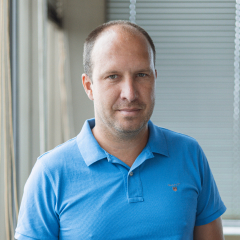
ITS blog: news in post-quantum cryptography - June 2025
2 min

The last few weeks have brought further concrete steps towards protection against quantum threats in Europe and the Czech Republic. Here is an update on the major events, projects and recommendations in the field of post-quantum security.
Key news for Europe: Coordinated EU transition to post-quantum encryption of critical infrastructure
On 13 May 2025, the European Union launched a coordinated initiative to ensure that all Member States switch to post-quantum encryption for critical infrastructure by 2030 at the latest.
What are the key points?
- Roadmap and recommendations: Member States are to start the transition by the end of 2026 at the latest, critical infrastructure must be protected by post-quantum cryptography by 2030.
- First steps: engaging key stakeholders (CISO, CTO, government, research), creating an up-to-date inventory of cryptographic assets, mapping dependencies and integrating quantum threats into risk management.
- Next steps: ensuring cryptographic agility, preparing systems for rapid updates, adapting legislation and certification schemes, investing in training and pilot projects.
- Emphasis on collaboration: knowledge sharing across the EU, involvement of suppliers and public and private stakeholders, participation in international testbeds and standardisation.
This initiative is crucial for Czech companies and institutions, which will have to demonstrate their ability to migrate securely to new encryption standards in the coming years. More detailed information and resources can be found here.
European events and trends
European Commission: proposal for compulsory migration at PQC
On 12 June, the European Commission published a proposal for a new directive that would make it mandatory to migrate to post-quantum algorithms for the government, healthcare, energy and financial sectors by 2030.
- Emphasis on interoperability: the Directive foresees mandatory support for two different PQC algorithms for key systems.
- Public consultation: open until 10 July, Czech companies and institutions can get involved and influence the final design.
Testing the European QKD network
On 27-29 May, the first pan-European QKD testing of the EuroQCI network took place in Brussels.
- Participation of the Czech Republic: Prague was one of the nodes of the test network, the results confirmed the compatibility of Czech and foreign components.
- Result: the European Cyber Security Agency (ENISA) report recommends accelerating the roll-out of QKD to other Member States.
New European investment in quantum startups
In June, EIC Fund announced investments in five European startups focused on post-quantum security and quantum sensors. Among those supported is Qubix Security, a Czech startup developing a hybrid encryption solution for cloud services.
Czech Republic: quantum security in practice & education
Start of the pilot project CZ-QCI
On 3 June, NUCIB, in cooperation with CTU and IT4Innovations, announced the launch of the pilot operation of the national quantum communication infrastructure CZ-QCI.
- The first line: the Prague-Brno line, using quantum key distribution (QKD) for secure data transfer between universities and state administration.
- Project goal: To verify the interoperability of European QCI networks and to prepare conditions for expansion to other cities.
- Supported by Digital Europe and part of the pan-European EuroQCI initiative.
New training programmes
The Faculty of Information Technology of CTU opened a new course "Post-Quantum Cryptography in Practice" in June. Focus: Practical deployment of NIST PQC algorithms, hybrid models and simulation of attacks. Courses are developed in collaboration with industry partners and are open to experts from companies.
Project Quantum Innovation Center Czech
On June 10, 2025, a press conference was held at CTU with the ceremonial signing of contracts that allow access to the platform for education in the field of quantum computing. Quantum Innovation Center Czech is a project that allows students of participating universities exclusive access to education and thus complements not only the emerging fields of study, but above all expands the base of future professionals. Objectives? To train five hundred quantum specialists over the next three years. We are very pleased to be an essential part of this project, along with IBM technologies. More information can be found in our news or on the web CTU
Quantum Hackathon Prague 2025
The first Czech Quantum Hackathon took place at CTU on 14-16 June . Among the topics were post-quantum authentication, secure IoT, and quantum random number generators. The winning team was the students of FIT CTU with the project "Q-SafeID" - a system for quantum secure login to banking applications.
First Czech industrial pilot with post-quantum protection
In June, Škoda Auto, in cooperation with Qubix Security and the Czech Technical University, deployed a pilot system for post-quantum protected communication between production lines and the headquarters in Mladá Boleslav. Technology: hybrid encryption (CRYSTALS-Kyber + classical algorithms), real-time monitoring. The aim of the pilot was to verify performance and compatibility in the Industrial Internet of Things (IIoT) environment.
Recommendations for organisations
- Keep an eye on the legislation: Join the public consultation on the European Directive on compulsory migration on PQC and follow the development of the EU recommendations.
- Test hybrid models: Take advantage of pilot projects with academic partners (e.g. CTU, IT4Innovations).
- Educate your teams: sign up experts for new courses and follow community events like the Quantum Hackathon.
- Consider investing in QKD: Keep an eye on the development of CZ-QCI and the possibility of connecting to the European infrastructure.
Conclusion
The Czech Republic and Europe are accelerating preparations for the quantum era. A combination of pilot projects, educational initiatives and legislative changes is creating room for innovation and strengthening digital security. Now is the ideal time to start taking concrete steps towards post-quantum protection - whether you are a company, a public institution or a research team.
What else to read
See more news from the world of IT and ITS




